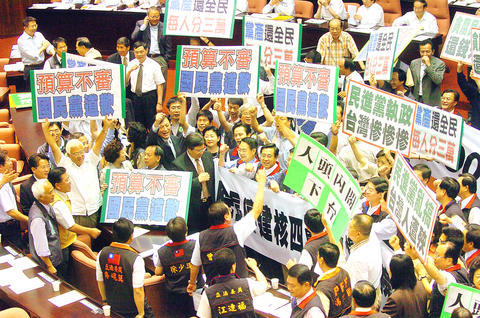A majority of Democratic Progressive Party (DPP) lawmakers yesterday signed a motion to hold a no-confidence vote against Premier Chang Chun-hsiung (張俊雄) in a move designed to pre-empt an opposition call to topple the Cabinet.
"What has been going on in the legislature is like a really bad play. It's time to pull down the stage, and for all of us to take a bow," DPP Legislator Chen Chin-de (陳金德), who initiated the move, told a press conference yesterday.
The Constitution stipulates that the president may, within 10 days after legislative approval of a no-confidence vote against the premier, dissolve the legislature.

PHOTO: LO PEI-DER, TAIPEI TIMES
"The motion is not about boycotting Chang," Cheng said. "As stipulated in the Constitution, toppling the Cabinet would pave the way for a new legislature," Chen said.
At the DPP caucus meeting, 45 of a total of 83 DPP lawmakers signed the proposal, leaving it 26 signatures short of the one-third threshold required to send the motion to the legislature.
Chen urged the People First Party (PFP), which controls 21 seats in the 216-member legislature, to "walk the walk and talk the talk."
The PFP had said after Chang was appointed as premier on May 15 that the party would work with their Chinese Nationalist Party (KMT) allies to oust him. However, the pan-blue camp hasn't taken any action since then.
PFP Spokesman Lee Hung-chun (
DPP legislative caucus whip Ker Chien-ming (
Chen said he had made the proposal to root out legislators who had paralyzed the government, enacted legislation in violation of the Constitution and impaired the legislature's dignity.
In related news, Chang yesterday defended his decision to halt construction of the Fourth Nuclear Power Plant project in 2000 during his first premiership.
Chang made the remarks as he briefed the Legislative Yuan on his administrative agenda.
Pan-blue lawmakers held up signs blasting Chang for his decision to suspend the project.
Under tremendous pressure here and abroad because of existing contracts to build the plant, construction was later restarted.
"Building a non-nuclear homeland was a campaign promise made by President Chen Shui-bian [陳水扁]," Chang told the legislature. "As Chen was elected, of course, he had to fulfill his promise."
"Legislative approval is not required to halt the execution of an approved budget," Chang said.
Chang yesterday also called on the legislature to pass this year's central government budget.
The budget, which should have been passed last November as stipulated in the Budget Law (
The opposition parties have demanded that amendments to the Organic Law of the Central Election Commission (
The pan-blue proposal calls for selecting commission members in proportion to the parties' number of seats in the legislature, which would give the pan-blues control of the commission. Members are currently nominated by the premier and appointed by the president.

NATIONAL SECURITY THREAT: An official said that Guan Guan’s comments had gone beyond the threshold of free speech, as she advocated for the destruction of the ROC China-born media influencer Guan Guan’s (關關) residency permit has been revoked for repeatedly posting pro-China content that threatens national security, the National Immigration Agency said yesterday. Guan Guan has said many controversial things in her videos posted to Douyin (抖音), including “the red flag will soon be painted all over Taiwan” and “Taiwan is an inseparable part of China,” while expressing hope for expedited “reunification.” The agency received multiple reports alleging that Guan Guan had advocated for armed reunification last year. After investigating, the agency last month issued a notice requiring her to appear and account for her actions. Guan Guan appeared as required,

A Vietnamese migrant worker yesterday won NT$12 million (US$379,627) on a Lunar New Year scratch card in Kaohsiung as part of Taiwan Lottery Co’s (台灣彩券) “NT$12 Million Grand Fortune” (1200萬大吉利) game. The man was the first top-prize winner of the new game launched on Jan. 6 to mark the Lunar New Year. Three Vietnamese migrant workers visited a Taiwan Lottery shop on Xinyue Street in Kaohsiung’s Gangshan District (崗山), a store representative said. The player bought multiple tickets and, after winning nothing, held the final lottery ticket in one hand and rubbed the store’s statue of the Maitreya Buddha’s belly with the other,

‘NATO-PLUS’: ‘Our strategic partners in the Indo-Pacific are facing increasing aggression by the Chinese Communist Party,’ US Representative Rob Wittman said The US House of Representatives on Monday released its version of the Consolidated Appropriations Act, which includes US$1.15 billion to support security cooperation with Taiwan. The omnibus act, covering US$1.2 trillion of spending, allocates US$1 billion for the Taiwan Security Cooperation Initiative, as well as US$150 million for the replacement of defense articles and reimbursement of defense services provided to Taiwan. The fund allocations were based on the US National Defense Authorization Act for fiscal 2026 that was passed by the US Congress last month and authorized up to US$1 billion to the US Defense Security Cooperation Agency in support of the

CLASSIFIED BRIEFING: The ministry said the special budget focuses on building a comprehensive defense system and strengthening the domestic defense industry The Ministry of National Defense yesterday released information on seven categories of weapons systems to be procured under a stalled NT$1.25 trillion (US$39.57 billion) special defense budget, including precision artillery, long-range missiles, air defense anti-tank missiles and more than 200,000 uncrewed aerial vehicles (UAVs). The Executive Yuan approved a draft version of the budget on Nov. 27 last year and submitted it to the legislature for review. The legislature’s Foreign Affairs and National Defense Committee yesterday invited Minister of National Defense Wellington Koo (顧立雄) to deliver a classified briefing and answer questions at a closed-door session. Koo said he hoped to provide lawmakers